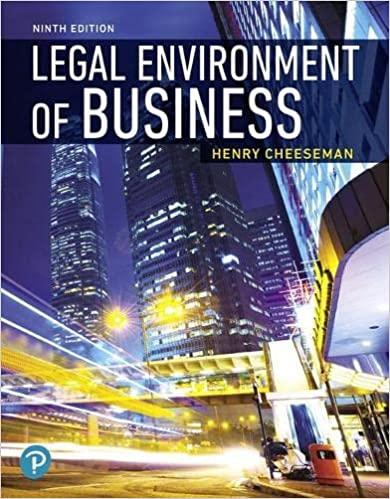Answered step by step
Verified Expert Solution
Question
1 Approved Answer
21. Assume you're in a jurisdiction that defines first degree murder as a premeditated and deliberate killing of one human being by another. Martin and
21. Assume you're in a jurisdiction that defines first degree murder as a premeditated and deliberate killing of one human being by another. Martin and Rose had been married for 30 years when Martin got diagnosed with a terminal disease. Martin was scared that he would suffer from pain as the disease progressed, so he begged Rose to, when the time came, administer a lethal dose of poison in order to kill him. Rose reluctantly agreed out of love for Martin, and because she hated the thought of him suffering. Assume they live in a jurisdiction where physician-assisted suicide was not an option. Several years after Rose had agreed to Martin's request that she administer a lethal dose of poison "when the time came," Martin found himself in unbearable pain due to the disease's progression. He asked Rose to carry through with their plan, and she did. Martin died due to the poison that Rose fed him, and Rose was charged with a homicide offense. What is the most applicable homicide charge based on these facts? A. Involuntary manslaughter B. Voluntary manslaughter C. Second degree murder D. First degree murder 22. A husband learned that his wife was having an affair with her boss. The husband was enraged, and offered his brother $50.000 to murder the boss; the brother agreed. The next week, after the husband had given the brother $25,000 as a down payment on the crime, the brother approached the boss in the office parking lot and shot him in the chest.The boss was found shortly thereafter by a colleague, and he was rushed to the hospital but died on the operating table. The husband and his brother were later charged in connection with the boss's death The husband is most likely to be convicted of which of the following common-law crimes? A. Murder, conspiracy to commit murder, and solicitation. B. Murder and conspiracy to commit murder only. C. Murder only. D. Solicitation only. 23. A woman discovered that her boyfriend was cheating on her. She approached the bartender at her local bar. She had heard the bartender was a member of a biker gang, and offered him $500 to beat up her boyfriend. The bartender agreed immediately. The bartender was actually an undercover officer, however, and he did not intend to beat up the boyfriend. The woman was arrested the next day and charged with solicitation and conspiracy. The jurisdiction recognizes the common law regarding these crimes. Are the charges against the woman proper? A. Yes as to solicitation and conspiracy. B. Yes as to solicitation, but no as to conspiracy. C. Yes as to conspiracy, but no as to solicitation. D. No as to all charges. 24. An amateur golfer had been taking golf lessons from a professional for many months. The professional owned a unique and expensive golf club, which he allowed the golfer to practice with during their lessons. One day, the professional stepped away from the driving range to answer an important phone call, leaving his golf clubs behind. The golfer looked around, and when no one else was looking, he put the golf club into his golf bag with the intent to keep the golf club. However, after a few seconds, he felt guilty and put the golf club back into the professional's golf bag. Has the golfer committed larceny? A. No, because he lacked the specific intent required for larceny. B. No, because he put the golf club back into the golf professional's golf bag. C. Yes, because he put the golf club into his golf bag with the intent to steal it. D. Yes, because larceny is a general-intent crime. 25. A man overheard his co-worker make a pass at his wife at an office party. The man was furious and went outside to collect his thoughts. A few minutes later, he returned to the party and joined his wife and his co-worker in their conversation. When the man's coworker excused himself to go to the restroom, the man followed him into the restroom and hit him over the head with a beer bottle. Although the man did not intend to kill his co-worker, the co-worker died as a result of the blow to the head. What is the most serious crime for which the man could properly be convicted? A. No criminal responsibility (i.e. not guilty of any crime). B. Involuntary manslaughter. C. Voluntary manslaughter. D. Murder
Step by Step Solution
There are 3 Steps involved in it
Step: 1

Get Instant Access to Expert-Tailored Solutions
See step-by-step solutions with expert insights and AI powered tools for academic success
Step: 2

Step: 3

Ace Your Homework with AI
Get the answers you need in no time with our AI-driven, step-by-step assistance
Get Started


